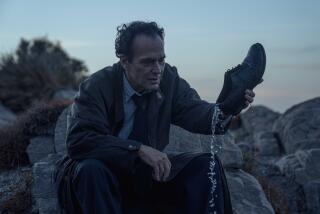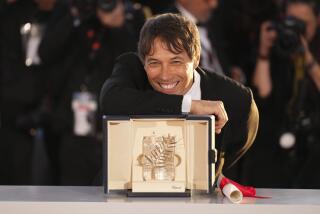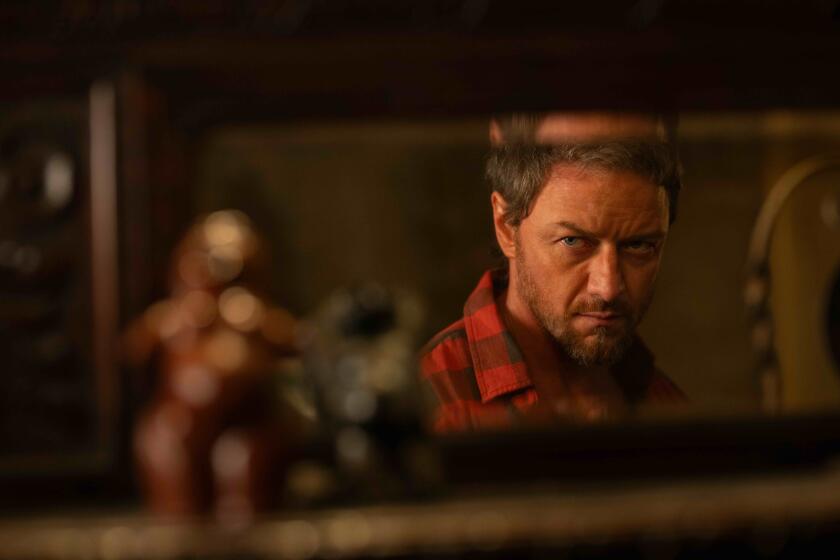Cannes 2014: With ‘Prophet,’ Salma Hayek seeks to realize a vision
CANNES, France--“I guess it is the end of the road,” Salma Hayek says, then laughs. “But it depends which road you mean.”
Hayek is sipping water at a table in a hotel backyard on a side street removed--somewhat--from the chaos of the Croisette, describing an epic quest that has not quite ended. As she talks to a reporter, she also waves to her six-year-old daughter on a terrace above, signals a message to a producer and then pauses to shake the hand of a tuxedoed Deepak Chopra, who has walked out to the backyard to say hi to her.
It was that kind of multitasking—and gladhanding—that served the Mexican-born actress well as she steered the most ambitious project of her career (and likely of many other careers)—producing an animated adaptation of the Lebanese writer Kahlil Gibran’s 1923 life-philosophy classic “The Prophet.” Though far from a likely source of film material, the collection of about 25 prose poems hs been a staple of meditative types for generations, and Hayek has assembled a movie based on eight of them, ranging in subject matter from love to childhood.
On Saturday, Hayek, 47, unveiled several sections of the film, titled Lee Daniels-ishly, “Kahlil Gibran’s The Prophet,” at a work-in-progress screening here. Gibran’s main character, the imprisoned Mustafa, could be seen telling various people around him of his travels and musings. (John Krasinski and Liam Neeson are among the voice actors.) There is an airiness to the visuals, which are composed of 2-D animation and light colors, but a kind of earnest thoughtfulness to the tone, in keeping with Gibran’s vibe.
“Most animated movies are light,” Hayek said in the interview. “We wanted to something serious but not preachy. And not necessarily religious either—this will be for religious people and atheists, because they’re subjects that affect everybody.”
The movie has been put together in a highly unusual way. A different director helmed an adaptation of each of the poems, with producers giving them autonomy to style their piece as they saw fit. It’s a heavy lineup of directors, including claypainting pioneer Joan Gratz, “The Secret of Kells” helmer Tomm Moore, ” French animation director Joann Sfar” (the man behind indie-animation darling “The Rabbi’s Cat”) and Mohammed Saeed Harib, creator of the hugely popular Arabic-language animated TV series “Freej.”
Then “The Lion King” director Roger Allers came on to synthesize the individual pieces into a single feature, using Mustafa’s teaching voice as the narrative glue.
The film represents an interesting career turn for a woman who appears determined to move beyond her romantic-comedy past. Hayek wasn’t even initially scheduled to act in “Prophet” at all, though she did end up voicing a supporting role.
Needless to say, it’s not a reinvention that’s came easily. Hayek, who has had parts in animated films such as “Puss in Boots,” is a lot more likely to get a warm Hollywood response to her interest in acting in an animated film than making one from scratch. “They were a little--skeptical,” she said, choosing her words carefully.
Even before all of that, her producing partners spent eight years negotiating for the rights to the book, which in the U.S. is not in the public domain but, rather, the private domain of the public. Gibran had bequeathed the rights to his village in Lebanon, and producers had to negotiate with a fractious city council of several dozen before work could begin.
Then came the studio-pitch part. Most said no not only because of the project’s unlikely overseer but because animation tends to be a big-budget, broad-humored affair, and an introspective examination of life’s larger meaning with few big story hooks was not exactly going to attract Pixar-size dollars.
Hayek was able to gather independent financing, but further problems crept in when an earlier team put together a movie that quickly saw the budget balloon to nearly double its allotted $12 million. She was eventually able to rein it in, replacing some key personalities, setting some financial guidelines for each section and using some technical workarounds that allowed for inexpensive 2-D backgrounds to look slicker.
At the screening, Hayek showed her skills as ringleader, smoothly introducing directors and composers and setting up clips for the Saturday night crowd. She also spoke of her lesser-known ancestry (her paternal grandfather is from Lebanon).
“In my very long career I haven’t been able to find an Arabic role to play,” she said. “This is a love letter to this part of my heritage.”
The movie does not yet have distribution in the U.S. or much of the world, and that could be an equally tough part of the road ahead. Hayek is first beginning to show cuts to distributors, and it remains to be seen how they will respond, particularly in the States, where the film’s style might feel more pointedly retro and the book doesn’t always have the same name recognition as it does in other parts of the world.
Hayek said that wherever the film lands in the U.S., she does not aim to specifically seek out the inspirational audience that has recently made films such as “Heaven Is For Real” a hit, though does hope they’re part of the larger audience.
Ultimately, she said, she wants it to appeal to multiple generations, but form a different angle. “Many animated films now have children taking their mothers. I think this could be something where mothers take their children,” she said.
Part of the reason for that, she said, is the timelessness of the text itself. She wants people’s minds to wander to their own lives during the film, as viewers reflect on the subjects that speak to them and where they find themselves. That is not, she reminds, a fixed target.
“When I read the book for the first time as a teenager the poem that touched me was the one about love,” she said. “In my 20’s and 30’s it was the one about good and evil. And now it’s about children. That’s what this book is, and what I hope the film is. It changes as you change.”
More to Read
Only good movies
Get the Indie Focus newsletter, Mark Olsen's weekly guide to the world of cinema.
You may occasionally receive promotional content from the Los Angeles Times.











